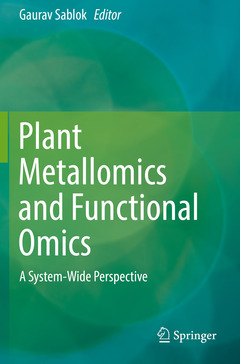Major portion of the planet earth is covered by seas and oceans representing 96.5% of the planet?s water, playing a detrimental role in sustaining the plant including crop diversity and productivity for human consumption. Water resources contain both soluble and transition metals, which are easily absorbed by plants through roots as a first point of contact and subsequently play important physiological and biological functions in plants. Transition metals such as copper (Cu), iron (Fe), manganese (Mn) and zinc (Zn) contribute to the plant productivity by playing key functional roles in the photosynthesis. In addition, to their major role in regulating the plant productivity, they also play an important role by acting as homeostatic regulators in uni-parentally inherited chloroplasts and maintains the flow of the electron transfer. It is worthwhile to mention that they play a critical role as transporters, which acts as electron balancing units for managing the electrostatic potential across the membranes. In contrast, some metals such as Cd, As play a significant role in inducing the stress mechanism and influencing either directly or in-directly Haber-Weiss reactions either through the production of the reactive oxygen species (ROS) or through the membrane damage thus leading to leakage of membrane transporters. However, besides playing a detrimental role as transporters in plant system, excessive accumulation of these metals due to the increasing contamination in the marginal soil and water are posing important threats to the plant system. Realizing the toxic effects of the metals, several physiological evidences have been laid for the credence of the metal toxicity and their concurrent effect on plant productivity. Increasing effects of the metals as toxicants can have three adverse effects on the populations: population can move, persist via local adaptation or phenotypic plasticity, or die. Next generation sequencing studies have revolutionized our abilities to detect the changes in expression profiles across an array of genes, which can in-turn help to develop early markers of metal induced stress. Plant Metallomics and Functional Omics: A System-Wide Perspective focuses on the applications of the system wide understanding of the biological and functional interplay occurring at the juncture of the metalloid induced stress and toxicity. The main goal of this book is to familiarize the readers with the most up-to-date information on metal-induced physiological changes in plant species.




